人教新目标版九年级中考英语一轮复习教材梳理八年级下册 Units 3-4 课件
文档属性
| 名称 | 人教新目标版九年级中考英语一轮复习教材梳理八年级下册 Units 3-4 课件 | 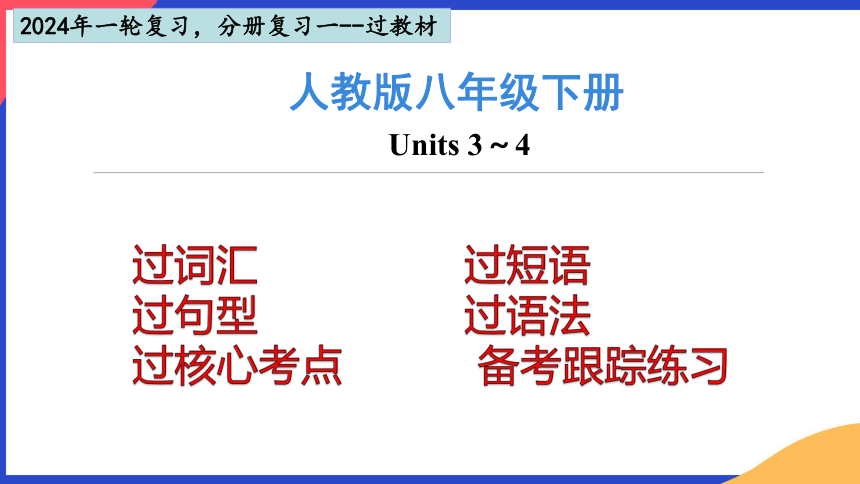 | |
| 格式 | pptx | ||
| 文件大小 | 2.1MB | ||
| 资源类型 | 试卷 | ||
| 版本资源 | 人教新目标(Go for it)版 | ||
| 科目 | 英语 | ||
| 更新时间 | 2024-03-13 08:07:46 | ||
图片预览

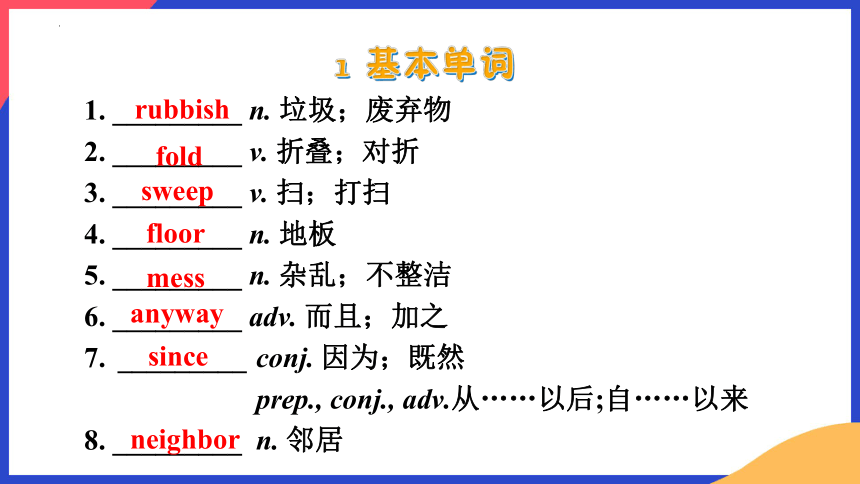
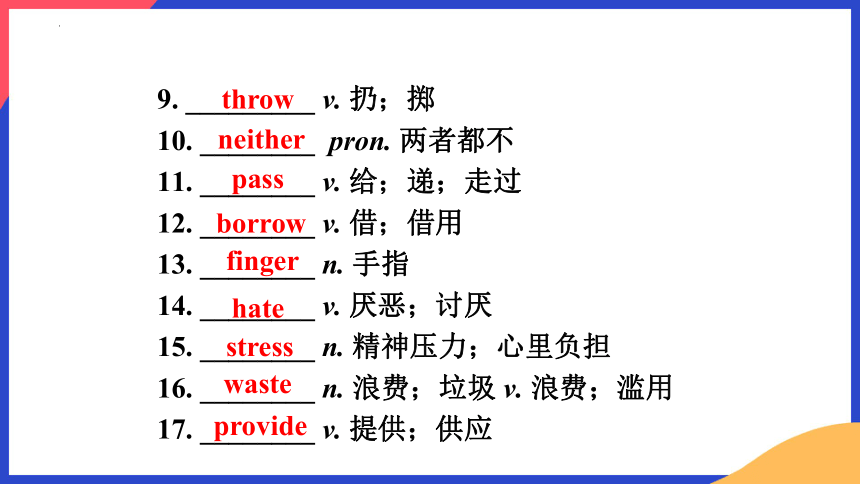
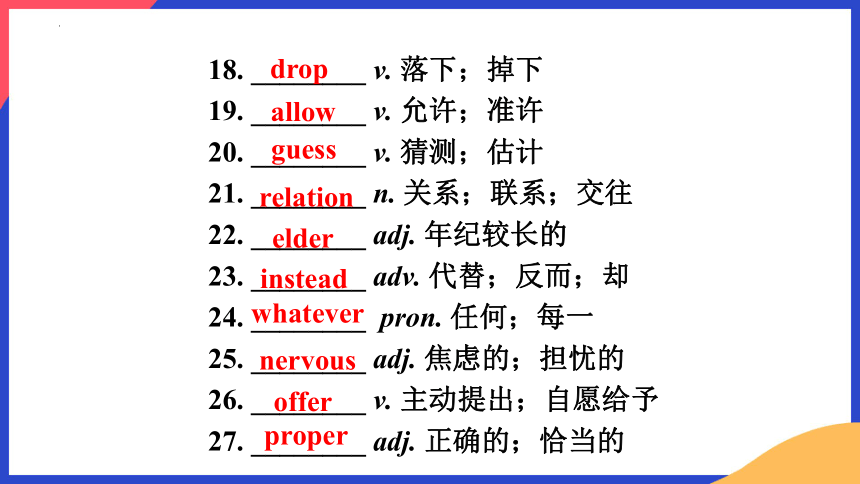
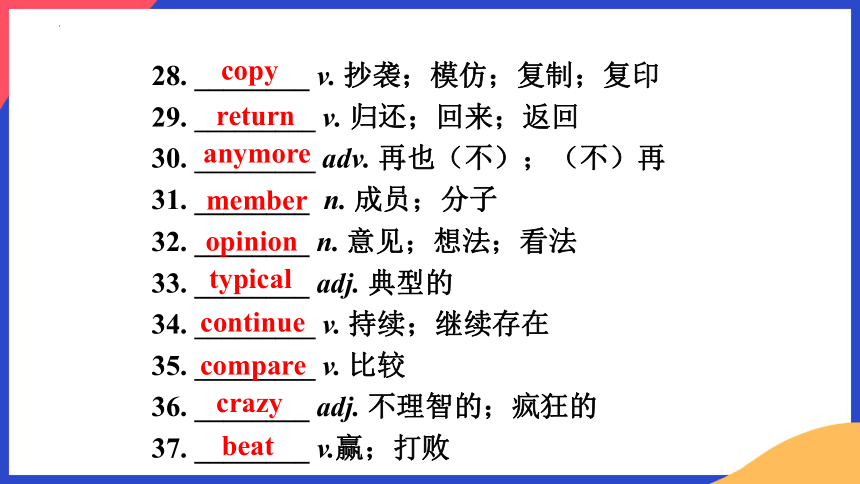
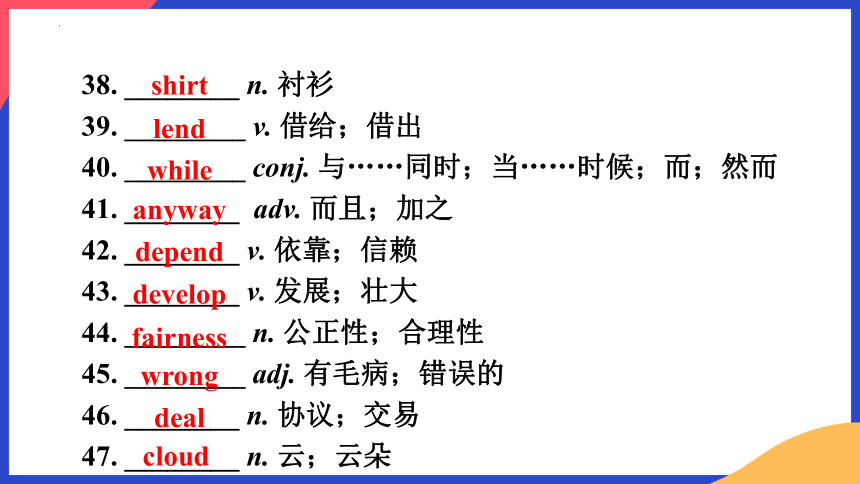
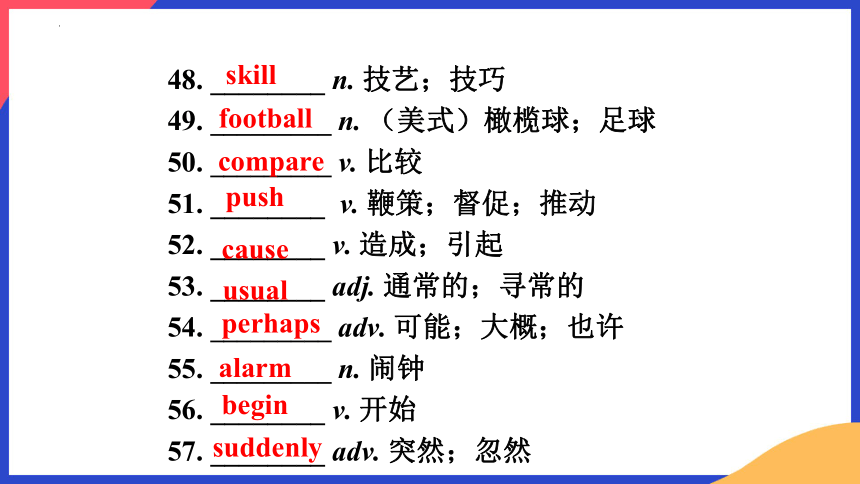
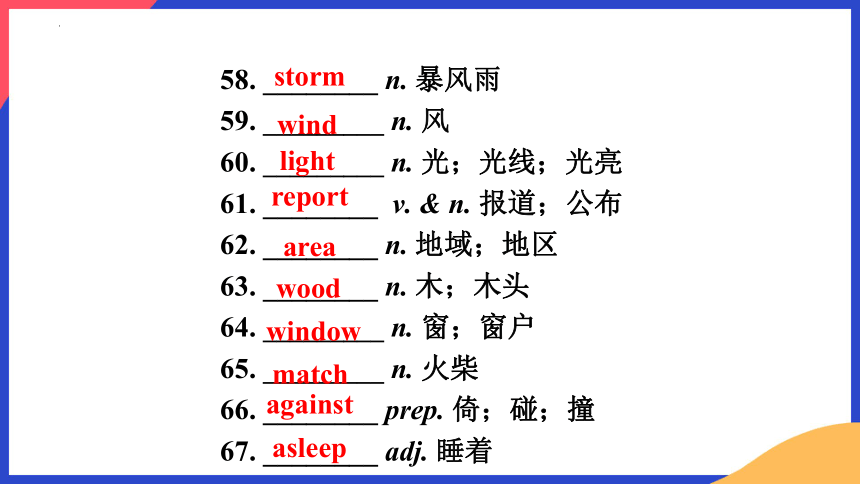
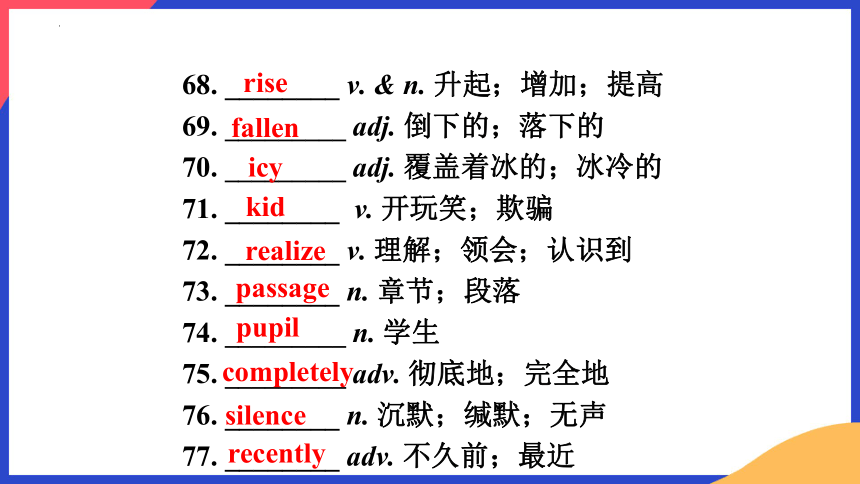
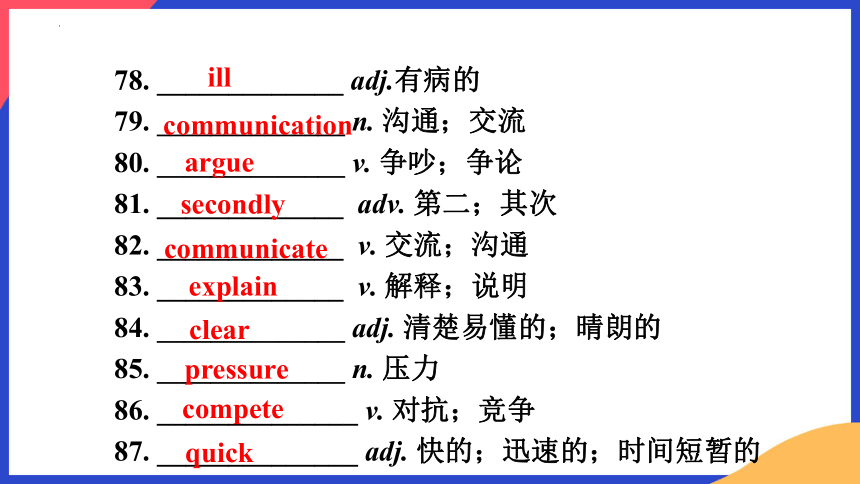
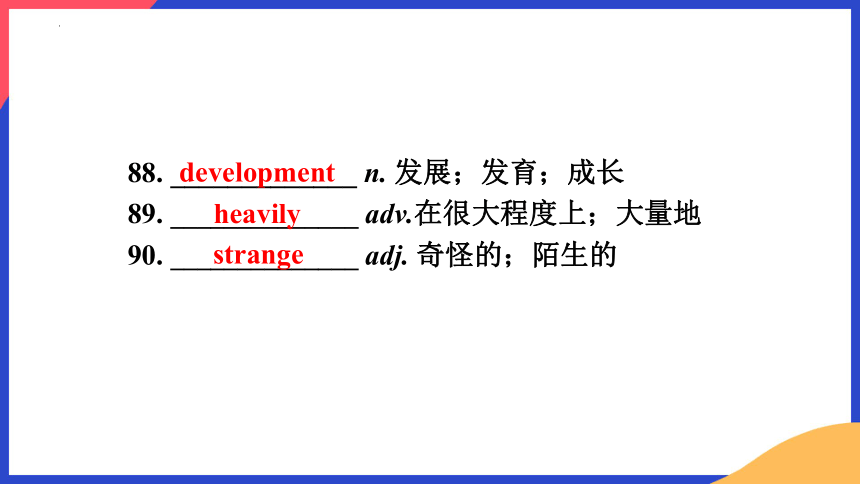
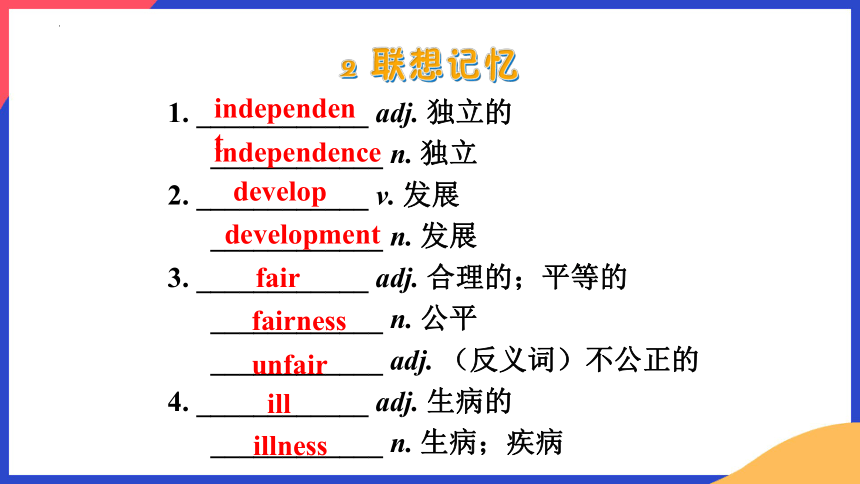
文档简介
(共110张PPT)
Units 3~4
过词汇 过短语
过句型 过语法 过核心考点 备考跟踪练习
2024年一轮复习,分册复习一--过教材
人教版八年级下册
1. _________ n. 垃圾;废弃物
2. _________ v. 折叠;对折
3. _________ v. 扫;打扫
4. _________ n. 地板
5. _________ n. 杂乱;不整洁
6. _________ adv. 而且;加之
7. _________ conj. 因为;既然
prep., conj., adv.从……以后;自……以来
8. _________ n. 邻居
rubbish
fold
sweep
floor
mess
anyway
neighbor
since
9. _________ v. 扔;掷
10. ________ pron. 两者都不
11. ________ v. 给;递;走过
12. ________ v. 借;借用
13. ________ n. 手指
14. ________ v. 厌恶;讨厌
15. ________ n. 精神压力;心里负担
16. ________ n. 浪费;垃圾 v. 浪费;滥用
17. ________ v. 提供;供应
throw
neither
finger
hate
provide
waste
stress
pass
borrow
18. ________ v. 落下;掉下
19. ________ v. 允许;准许
20. ________ v. 猜测;估计
21. ________ n. 关系;联系;交往
22. ________ adj. 年纪较长的
23. ________ adv. 代替;反而;却
24. ________ pron. 任何;每一
25. ________ adj. 焦虑的;担忧的
26. ________ v. 主动提出;自愿给予
27. ________ adj. 正确的;恰当的
allow
drop
guess
relation
elder
instead
whatever
proper
nervous
offer
32. ________ n. 意见;想法;看法
33. ________ adj. 典型的
34. _________ v. 持续;继续存在
35. _________ v. 比较
36. ________ adj. 不理智的;疯狂的
37. ________ v.赢;打败
28. ________ v. 抄袭;模仿;复制;复印
29. _________ v. 归还;回来;返回
30. _________ adv. 再也(不);(不)再
31. ________ n. 成员;分子
return
anymore
opinion
typical
continue
compare
crazy
copy
member
beat
38. ________ n. 衬衫
39. _________ v. 借给;借出
40. _________ conj. 与……同时;当……时候;而;然而
41. ________ adv. 而且;加之
42. ________ v. 依靠;信赖
43. ________ v. 发展;壮大
44. _________ n. 公正性;合理性
45. _________ adj. 有毛病;错误的
46. ________ n. 协议;交易
47. ________ n. 云;云朵
lend
while
depend
develop
fairness
wrong
deal
shirt
anyway
cloud
48. ________ n. 技艺;技巧
49. _________ n. (美式)橄榄球;足球
50. _________ v. 比较
51. ________ v. 鞭策;督促;推动
52. ________ v. 造成;引起
53. ________ adj. 通常的;寻常的
54. _________ adv. 可能;大概;也许
55. _________ n. 闹钟
56. ________ v. 开始
57. ________ adv. 突然;忽然
football
compare
cause
usual
perhaps
alarm
begin
skill
push
suddenly
58. ________ n. 暴风雨
59. _________ n. 风
60. _________ n. 光;光线;光亮
61. ________ v. & n. 报道;公布
62. ________ n. 地域;地区
63. ________ n. 木;木头
64. _________ n. 窗;窗户
65. _________ n. 火柴
66. ________ prep. 倚;碰;撞
67. ________ adj. 睡着
wind
light
area
wood
window
match
against
storm
report
asleep
68. ________ v. & n. 升起;增加;提高
69. _________ adj. 倒下的;落下的
70. _________ adj. 覆盖着冰的;冰冷的
71. ________ v. 开玩笑;欺骗
72. ________ v. 理解;领会;认识到
73. ________ n. 章节;段落
74. _________ n. 学生
75. _________ adv. 彻底地;完全地
76. ________ n. 沉默;缄默;无声
77. ________ adv. 不久前;最近
fallen
icy
realize
passage
pupil
completely
silence
rise
kid
recently
78. _____________ adj.有病的
79. ______________ n. 沟通;交流
80. ______________ v. 争吵;争论
81. _____________ adv. 第二;其次
82. _____________ v. 交流;沟通
83. _____________ v. 解释;说明
84. ______________ adj. 清楚易懂的;晴朗的
85. ______________ n. 压力
86. ______________ v. 对抗;竞争
87. ______________ adj. 快的;迅速的;时间短暂的
communication
argue
communicate
explain
clear
pressure
compete
ill
secondly
quick
88. _____________ n. 发展;发育;成长
89. ______________ adv.在很大程度上;大量地
90. ______________ adj. 奇怪的;陌生的
development
heavily
strange
1. ____________ adj. 独立的
____________ n. 独立
2. ____________ v. 发展
____________ n. 发展
3. ____________ adj. 合理的;平等的
____________ n. 公平
____________ adj. (反义词)不公正的
4. ____________ adj. 生病的
____________ n. 生病;疾病
unfair
independence
development
fairness
independent
develop
fair
illness
ill
5. _____________ v. 交流
_____________ n. 交流
6. _____________ v. 争辩;争论
_____________ n.争辩;争吵
communication
argue
argument
communicate
7. _____________ det. 第二;n. 秒
_____________ adv. 第二
8. _____________ v.解释
_____________ n. 解释
9. _____________adj. 清楚的;晴朗的
_____________adv. 清楚地
secondly
explain
clear
second
explanation
clearly
10. __________ v. 压;按
__________ n. 压力
11. __________ v. 竞争
__________ n. 完成
pressure
competition
press
compete
12. __________ adj. 重的;严重的
__________ adv.在很大程度上;大量地
13. __________ adj. 奇怪的;陌生的
__________ n. 陌生人
heavily
stranger
heavy
strange
1. ______________频繁;反复
2. ______________一……就……
3. ______________目的是;为了
4. ______________依靠;信赖
5. ______________照顾;处理
6. ______________快速查阅;浏览
7. ______________重要的事
8. ______________成功地发展;解决
9. ______________和睦相处;关系良好
all the time
as soon as
in order to
depend on
take care of
look through
big deal
work out
get on with
10. ______________删除;删去
11. ______________比较;对比
12. ______________依……看
13. ______________ (闹钟)发出声响
14. ______________接电话
15. ______________进入梦乡;睡着
16. ______________逐渐变弱;逐渐消失
17. ______________看一看
18. ______________前往;费力地前进
19. ______________沉默;无声
cut out
compare…with
in one’s opinion
go off
pick up
fall asleep
die down
have a look
make one’s way
in silence
20. __________________拆除;往下拽
21. __________________首先;起初
22. __________________倒垃圾
23. __________________随时;马上
24. __________________结果
25. __________________浪费时间
26. __________________生某人的气
27. __________________对某人友好
28. __________________参与/ 卷入打架中
29. __________________将某物归还给某人
take down
at first
take out the rubbish
any minute now
as a result
a waste of time
be angry with sb.
be nice to sb.
get into a fight
give sth. back to sb.
30. _________________________抄袭某人的作业
31. _________________________培养某人的独立性
32. _________________________做家务
33. _________________________清洗餐具
34. _________________________叠某人的衣服
35. _________________________搭便车
36. _________________________一团糟
37. _________________________在困难的时候
38. _________________________借给某人某物
39. _________________________扔下
copy one’s homework
develop one’s independence
do chores
do the dishes
fold one’s clothes
get a ride
in a mess
in times of difficulty
lend sb. sth.
throw down
1. Although she’s wrong, it’s not a big deal.
2. Also, when they get older, they will have to do housework so there is no need for them to do it now.
3. Why don’t you talk about these feelings with your family
4. However, the tired children don’t get home until after 7:00 p.m.
5. The minute I sat down in front of the TV, my mom came over. = My mom came over as soon as I sat down in front of the TV.
6. The earlier kids learn to be independent, the better it is for their future.
7. It is the parents’ job to provide a clean and comfortable environment at home for their children.
8. —What was Jenny doing while Linda was sleeping
—While Linda was sleeping, Jenny was helping Mary with her homework.
1. throw v. 扔;掷
throw down 扔下
throw at 扔向
throw away 扔掉
throw sb. sth.= throw sth. to sb.
把某物扔给某人
1. Don't leave your toys on the table, or I ______them away.
A. threw B. will throw C. have thrown D. was throwing
(2022江西中考)
2. —Sam, let's _______ these old things. I don't need them anymore.
— No. We can try to put them to good use.
A. pull down B. fix up C. hand out D. throw away
(2021辽宁铁岭、葫芦岛中考)
D
B
2. neither adv. 也不
pron. 两者都不
adv.也不,常用于固定结构“neither+系动词 / 助动词 / 情态动词+主语”中。
pron. 两者都不,常与介词of连用,也可以单独使用。当neither of ... 作主语时,谓语动词既可用单数形式也可用复数形式。
both, either, neither, all 和none
代词 用法 谓语形式
both 都(=2),表肯定含义 复数
all 都(≥3),表肯定含义 复数
neither 都不(=2),表否定含义 单数
none 都不(≥3),表否定含义 根据指代的名词可数或不可数来判断
either 两者中任意一个,表肯定含义 单数
I tried to buy the dictionary in two bookstores, but ______
of them had it.
A. both B. all C. neither D. none
(2023辽宁本溪、葫芦岛中考)
C
2. —Jack, when are we going to buy a birthday gift for our
grandma, today or tomorrow
—______are OK. I am available. (2023新疆中考)
A. All B. Both C. Neither D. None
3. — There are two books about Chinese traditional tea-making culture.
— You’re free to take ______ of them and leave one for me.
A. all B. either C. neither D. none
(2023四川泸州中考)
B
B
4. Neither Saturday nor Sunday _____ OK because I will be quite busy these two days.
A. are B. is C. am D. be
(2022贵州毕节中考)
5. — Li Ping, I didn’t go summer camping last year.
— _____.
A. So did I B. Neither did I
C. Neither I did D. So I did
(2022贵州铜仁中考)
B
B
3. borrow v. 借;借用
词汇 含义及用法 搭配
borrow 对主语而言是“借入”,指从别人那里借东西。 borrow sth.(from sb.)
lend 对主语而言是“借出”,与borrow方向相反,指借东西给别人。 lend sb. sth.
lend sth. to sb.
keep 保留,保存(本意);借用(引申),延续性动词,可以和一段时间及how long连用。 keep...for+一段时间
borrow, lend, keep
1. —Could I ________ the book for two more days
—Sorry, you can't. You must follow our rules.
A. borrow B. lend C. keep
(2023四川自贡中考)
2. —May I ________ your pen I can’t find mine.
—Sure. Here you are.
A. repair B. make C. borrow
(2022福建中考)
C
C
4. provide v. 提供;供应
e.g. Could you provide us with water
= Could you provide water for us
provide sb. with sth. = provide sth. for sb.
给某人提供某物
词汇 相同点 含义及用法 常用结构
offer 都有“提供”的意思 常用来表示主动提供某物 offer sb. sth.=offer sth. to sb.
provide 提供,供给。用于表示提供需要或有用的东西 provide sth. for sb.或provide sb. with sth.
supply 强调定期供应大量物资、存货等。 supply sb. with sth.= supply sth. to sb.
offer, provide, supply
—A new high-speed railway began to ________ service at Hezedong Railway Station on December 26, 2021.
—Wonderful. It is very convenient for us to travel.
A.offer B.enjoy C.organize
(2022山东菏泽中考)
A
5. develop v. 发展;培养
development n. 发展
developing adj. 发展中的
developed adj. 发达的
e.g. Human beings developed from earlier species of animals.
Pete is head of product development.
China is a developing country.
Dogs have a highly developed sense of smell.
1. ChatGPT, an AI chatbot, was _____________ (develop) by OpenAI and met the public in November, 2022.
(2023甘肃武威中考)
2. With the _____________(develop) of science and technology,
people can live a better life in the future.
(2021黑龙江龙东中考)
development
用所给单词的适当形式填空。
developed
6. allow v. 允许;准许
allow+ n./pron. 允许……
allow sb. (not) to do sth. (不)允许某人做某事
be allowed to do sth. 被允许做某事
allow doing sth. 允许做某事
1. People are not __________ (允许) to talk loudly when they are in the library. (2023四川广安中考)
2. My parents don't __________ (允许) me to hang out with friends at night. (2021贵州铜仁中考)
3. I don’t think students should be ________(允许) to bring mobile phones to school.
(2021新疆中考)
allow
allowed
allowed
7. argue vi. 争吵;争论
argument n. 争吵;争论
argue with sb. 和某人争吵
argue about / over sth. 就某事争论
8. compete v. 竞争;对抗
compete with sb. 与某人竞争
compete for 为……竞争
competition n. 比赛;竞争(可数名词)
—Hangzhou will hold the 19th Asian Games from
September 23 to October 8, 2023.
—Right. Players will _______ in forty sports, such
as swimming, table tennis and volleyball.
A. compete B. believe
C. imagine D. advise
(2023湖北荆州中考)
A
9. elder adj. 年纪较长的
elder/older
词汇 含义及用法
elder “年长的”, 指家庭里两个成员中年龄较长的, 只用作定语, 不用作表语。elder也可以用作名词, 其复数形式表示“长者, 长辈”。
older 是形容词old 的比较级形式, 指年龄较大、较老, 也指较旧。可以与than连用。
用elder/older完成句子。
1) — Do you know the girl over there
— Yes, I do. She is my ______ sister.
2) Tony is ______ than me.
elder
older
10. instead adv. 代替;反而;却
词汇 instead instead of
意义 反而,却 代替,而不是
词性 副词 短语介词
在句中的位置 可位于句子的开头 ,这时多用逗号与句子的主体部分隔开。 在句中的位置比较灵活,但不可单独使用,其后接的宾语多由名词、代词、 v.-ing形式等充当。
可位于句子的结尾,此时不用逗号与句子的主体部分隔开。 instead & instead of
We need to tell people to just do one small thing well _____ 100 things poorly.
A. as well as B. instead of C. according to D. because of
(2023江苏中考)
B
11. compare v. 比较
词组 用法
compare...with… 把……和……比较(常表示同类相比,比较) compare with
compare...to... 把……比作……(常表示异类相比,比喻)compare to
Don’t _______ child with others because every child is a treasure.
A. compare B. complain C. contact D. consider
(2021江苏常州中考)
A
beat
v. 敲打
v. 打败
宾语通常是比赛、战斗的对手。
v. 使(鼓、翅膀、心脏)规律作响;
作节奏运动
win的宾语通常是比赛、比赛的名次或奖品、战斗、战争、金钱等。
12. beat
完成句子。
1) 听!有人在敲鼓。
Listen! Someone __________________.
2) 我能感觉到我的心跳得很快。
I could feel _______________________ quickly.
3) 在昨天的篮球赛中我们队打败了他们队。
Our team _______________________in yesterday’s
basketball game.
my heart beating
is beating a drum
beat their team
1. come over 过来;顺便来访
动词+over的短语
think over 仔细考虑
get over 克服
take over 接管
look over 仔细检查
go over 复习;检查
2. all the time 一直;总是
for the first time 第一次
from time to time 有时;偶尔
at times 不时;有时
in time 及时
on time 按时
at the same time 同时
at any time 随时
in no time 立即;马上
time短语
3. as soon as 一……就……
as soon as possible 尽快
如果主句为将来时态,其引导的从句通常用一般现在时表示将来。
1. — When will you go to see your grandpa
— I'll see him ________ I get off the plane. You know I
miss him very much. (2021湖北襄阳中考)
A. as soon as B. as long as
C. as far as D. as easily as
2. We were lucky yesterday. The bus left ________we got on it.
A. before B. although C. until D. as soon as
(2021重庆中考B卷)
A
D
4. depend on 依靠;信赖
由……决定;取决于
turn on 打开 get on 上车
come on 快点 insist on 坚持
call on 号召 live on 以……为生
depend on 依靠 put on 穿上;戴上
动词+on的短语
1. —Ms. White, I am sad that I didn't pass the test.
—Keep trying. Success ______ hard work.
A. depends on B. gives away C. leads to
(2023四川自贡中考)
2. —It's said that ChatGPT has both good and bad sides.
—Well. It all ______ how you use it
A. leads to B. sounds like C. turns into D. depends on
(2023四川遂宁中考)
D
A
5. work out
熟义:解决
生义:制定,拟定;算出
e.g. Each year, the company will work out a list of the
world’s most crowded cities.
Do you know how to work out the difficult math
problem
set out 出发 put out 熄灭
point out 指出 hand out 分发
run out 用完 give out 分发;散发
come out 出版 look out 小心;当心
turn out 结果是 take out 取出
break out 爆发
动词+out短语
Our team ________ what to do about the project and successfully completed it on time.
A. gave up B. worked out
C. turned down D. took away
(2023安徽中考)
B
6. cut out 删除;删去
cut in line 插队
cut off 切除
cut in 打断
cut down 砍伐
cut up 切碎
cut短语
1. —Honey, could you help me ________ the picture of colorful balloons from the paper
—OK, Mum. I'm coming!
A. cut out B. carry out C. turn out D. work out
(2021 江苏南通中考)
2. Wait politely, please. Don't ____________ on others.
A. cut in B. cut down C. cut out D. cut short
(2021江苏连云港中考)
A
A
7. pick up 接电话
拾起;捡起
e.g. He picked up his cap and went away.
开车去接
e.g. I will go to the airport and pick up my uncle.
pick up含义
Please ________ the rubbish and put it into the proper rubbish bin.
A. look up B. pick up C. grow up
(2021黑龙江牡丹江鸡西中考)
B
8. fall asleep 睡着
asleep adj. 睡着的
fall behind 落后
fall off 跌落;减少
fall down 跌倒
fall ill 生病
fall into 落入;掉入
fall短语
9. take down 拆除;往下拽;记下;写下; 拿下;
取下
含down的短语
break down 出故障;坏掉
calm down 冷静下来
close down (永久)关闭;关停
count down 倒数;倒计时
cut down 砍倒;删减
die down 逐渐变弱;逐渐消失
fall down 突然倒下;跌倒;倒塌
let ... down 使失望
lie down 躺下
look down 俯视
pull down 摧毁
put ... down 拆下;摧毁
sit down 坐下
turn down 把……调低;关小;拒绝
write down 写下;记录下
1. — Julie, why did you ________ the job
— Because I found a better one.
A. turn up B. turn down
C. look for D. look through
(2022广西贵港中考)
2. If you ________ his invitation, he will be unhappy.
A. cut down B. write down C. take down D. turn down
(2021辽宁丹东中考)
D
B
10. at first 起初, 首先(介词短语, 只起副词作用,在句中用作状语)。
at last 最后;终于
at first主要用于强调前后对照, 暗示接下去的动作与前面的动作不同甚至相反, 因此常有but, afterwards, soon, at last等相呼应。
单项选择。
______ I thought he was shy, but then I discovered he was just not interested in other people.
A. As usual B. At first
C. After all D. So far
B
Also, when they get older, they will have to do housework so there is no need for them to do it now.
there is no need (for sb.) to do sth.
(对某人来说)没必要做某事
e.g. There’s no need to go there by bus.
没必要乘坐公共汽车去那里。
2. Why don’t you go to sleep earlier this evening
Why don’t you do sth. = Why not do sth.
回答:Good idea!/ Sure!/ Good!
表示赞同。如果表示反对,直接说出理由。
3. When you called, I was taking a shower.
由when引导的时间状语从句,“当……的时候”。
后面通常接时间点,从句中的谓语动词用短暂性动词。
— I called you last night but you didn’t answer.
— Sorry, Grace. I _______ Singer when the phone rang.
A. am watching B. was watching C. have watched
B
4. So while you were sleeping, I called Jenny and she helped me.
while conj. 当……的时候
后面只能接一段时间,不能接时间点,while引导的从句中的动词要用延续性动词。
while引导的从句的动作或状态往往与主句的动作同时发生。
1. Lisa was busy taking notes _______ Mark was giving a talk.
A. if B. unless C. until D. while
(2023河北中考)
2. —We can't get on or off a bus _______ it is moving.
—You're right.
A. unless B. before C. while D. until
(2021 广西贵港中考)
D
C
情态动词
情态动词具有一定的含义,不能单独作谓语,必须和动词原形连用,一起构成谓语,用来表示愿望、态度或推测等。
一、情态动词的情态意义表示法
考点一:can可表示现在或将来的能力,意为“能;会”。can还可表示请求、允许,意为“可以”。can’t意为“不能,不可以”。
考点二:could可表示过去的能力。当 could表示请求、允许时,语气比can更加委婉、客气。couldn’t意为“不能”。
考点三:may表示请求、允许,意为“可以”。
考点四:might表示允许时,语气比may更加委婉、客气。
考点五:must表示义务、命令或必要,意为“必须”,强调主观看法。mustn’t表示“不允许;禁止”之意。
考点六:have to意为“不得不”,强调客观需要。
考点七:should意为“应该”,既可以表示义务或责任,也可以表示劝告或建议。 其否定式为shouldn’t,意为“不应该”。
考点八:had better意为“最好”,其否定式是had better not。
考点九:need表示“需要”,通常用于否定句或疑问句中。
二、情态动词的推测用法
情态动词 肯定式 否定式 疑问式
must 必定;必然 / /
can / 不可能 有可能吗
could 微弱的可能 不可能 有可能吗
may 或许;也许 可能不 /
might 可能 可能不 /
动词的时态
一般现在时
考点一:表示经常性或习惯性的动作,常与often, usually,
always, sometimes, every day等连用或根据上下文语境判断。
考点二:表示现在的情况或状态。
考点三:表示按照时刻表要发生的事情。
考点四:表示客观事实或永恒的真理。
考点五:如果主句为一般将来时,在时间、条件状语从句中,
用一般现在时表示将来。
一般将来时
考点一:表示将来要发生的动作或存在的状态,常与表示将来的时间状语 tomorrow, next time, in a few days, next Tuesday, some day, in the future, in +时 间 段, soon, right away, this coming Monday ... 等连用或根据上下文语境判断,其谓语结构为“will +动词原形”。
考点二:“be going to +动词原形”也表示将要发生的动作
或安排、打算,或有某种迹象表明即将发生某事。
考点三:存现句的一般将来时肯定句结构为:there will be +
主语+其他或there is / are going to be +主语+其他。
温馨提示
其他可表示将来的时态:
现在进行时可表示计划或准备要做的事,且已经做好了准备;
2. 一般现在时可表示按计划要发生的事。
知识导图
过去进行时
考点一:表示过去某一时刻或某一段时间正在进行的动作,常与at that time, at this time yesterday, all morning yesterday等时间状语或由when, while引导的时间状语从句连用或根据上下文语境判断。
考点二:由when引导的时间状语从句,若主句的动作正在进行时从句的动作发生了,则主句用过去进行时,从句用一般过去时。
考点三:由while引导的时间状语从句,若从句的动作正在进行时主句的动作发生了,则从句用过去进行时,主句用一般过去时。若主从句的动作在过去同时进行,则主从句均用过去进行时。
一般过去时
考点一:表示过去发生的动作或存在的状态,常与the day before yesterday, yesterday, ... ago, last ..., just now, in 2016等连用或根据上下文语境判断。
考点二:表示过去的习惯或经常发生的动作或状态,句中
常有always, often, usually等频度副词。
现在完成时
考点一:表示过去发生或已经完成的动作对现在造成的影响或结果,常与 already, just, yet, ever, never, before, so far, recently, in / over the past / last ... years / months 等连用或根据上下文语境判断。
考点二:表示过去某一时间开始并一直持续到现在的动作或状态,也许还要持续下去。该用法常适用于延续性动词,常与for +时间段或since +时间点或since引导的时间状语从句连用。
考点三:一些短暂性动词转换成意义相近的延续性动词或 be +形容词 / 副词 / 介词短语 / a(n) +名词,与表示一段时间的状语连用。如:
buy → have borrow → keep move → live die → be dead open → be open close → be closed
fall asleep → be asleep leave → be away
come → be in / at marry → be married
begin / start (电影等开始) → be on
join → be in +组织 / be a member in +组织
考点四:have / has been to 表示“到过某地(现在已经回来了)”,句中常有表示次数的词语,如once, twice, three times等;have / has gone to表示“去某地了(但还没有回来)”。
连词
连词按性质主要分为两类:并列连词和从属连词。
一、并列连词(连接意义相关、层次相同的两个单词、短语或分句)
考点一:and表示并列、顺承等关系。
考点二:or表示选择关系,意为“或;还是”,通常用于肯
定句或选择疑问句中。
在否定句中连接并列成分时,则表示“也不”。
考点三:and / or常用于句型“祈使句(,) + and / or ...”中。and表示“那么;则”,or表示“否则”。祈使句具有条件句的含义。
考点四:but, yet表示转折关系。
考点五:so, for表示因果关系。for通常是对前面的情况加以解释,不能回答why引导的问句。
考点六:其他并列连词有both ... and ...,either ... or ...,not only ... but also ...,neither ... nor ... 和not ... but ...。
二、从属连词(连接主从复合句)
考点一:引导时间状语从句的从属连词有when, while,
before, after, until / till, since (自从), as soon as等。
1. when表示“当……的时候”时,其引导的从句的动词既可用延续性动词也可用短暂性动词。而while表示“与……同时;当……的时候”时,其引导的从句的动词常为延续性动词或表状态的动词。
温馨提示
2. until / till用在肯定句中,表示“一直到……时(为止)”,主句中的动词为延续性动词;用在否定句中,表示“直到……才……”,可以和before引导的从句进行同义句转化。
注意:until / till也可作介词。
3. since表示“自从”。当since引导的从句用一般过去时时,主句通常用现在完成时。句型“It has been / It is +时间段+ since ...”表示“自从……以来已经有多长时间了”。
注意:since也可作介词。
考点二:引导条件状语从句的从属连词有if, unless, as long as等。
温馨提示
在含有if引导的条件状语从句的复合句中,如果主句用一般将来时,if引导的条件状语从句用一般现在时。如果主句是祈使句或者主句的谓语部分含有情态动词,if引导的条件状语从句也常用一般现在时。
考点三:引导结果状语从句的从属连词有so ... that ..., such ... that ..., so that等。
温馨提示
1. 在 so ... that ... 结构中,so是副词,只能修饰形容词或副词。so ... that ...可用于以下句型结构中:
· so +形容词 / 副词+ that从句
· so +形容词+ a / an +可数名词单数形式+ that从句
· so + many / few +可数名词复数形式+ that从句
· so + much / little +不可数名词+ that从句
2. 在such ... that ... 结构中,such修饰名词(短语)。
such ... that ...可用于以下句型结构中:
· such + a / an +形容词+可数名词单数形式+ that从句
· such +形容词+可数名词复数形式 / 不可数名词+that
从句
考点四:引导原因状语从句的从属连词有because, since (既然)等。
考点五:引导目的状语从句的从属连词有so that, in order that等。
考点六:引导让步状语从句的从属连词有although / though, even though / even if, 疑问词+ -ever / no matter +疑问词(不管……;无论), whether ... or ... (不管……还是……)等。
温馨提示
although / though 可以与 yet, still 连用,但不能和but连用。
情态动词
Your answer ________ be right, but I’m going to check to make sure.
A. can’t B. might C. must
(2023四川成都中考)
2. —________ I join the volunteer program on weekends
— Of course you can.
A. Can B. Must C. Should
(2023湖南怀化中考)
B
A
3. Earthquakes can be very dangerous. We _________ learn to protect ourselves.
A. might B. should C. could D. would
(2023江苏连云港)
4. —Would you like to visit Tianjin University tomorrow
—Sorry, I’m afraid I _________, I’ll work as a volunteer in my community.
A. can B. can’t C. must D. mustn’t
(2022江苏常州中考)
B
B
5. —The paper cutting is pretty lively. Who made it
—It ________ be Mary. None of us except her is able to do
it. (2023山东滨州中考)
A. can B. must C. need D. might
6. If we_______ find a better way, we'll finish the job faster.
A. can B. can’t C. must D. mustn’t
(2023河北中考)
7. —It's such a long way!
—Don't worry. You ________ share a ride with me.
A. must B. can C. should
(2023福建中考)
B
A
B
过去进行时
I am sorry I didn’t answer your phone because I ________
the piano at that time.
A. played B. was playing C. am playing
(2023四川成都中考)
2. — I saw your light still on at 11:30 last night.
— Oh, I ________ an exciting book at that time. I lost myself in the story.
A. read B. am reading C. was reading
(2023四川凉山中考)
B
C
备考跟踪训练
一、单项选择。
1.(2021,襄阳)—When will you go to see your grandpa
—I’ll see him ____ I get off the plane. You know I miss him very much.
A. as soon as B. as long as C. as far as D. as easily as
A
2.(2021,南京)The drama Yuhuayao ____ citizens in Nanjing with a chance to learn and listen to the Party’s history.
A. provided B. guarded C. compared D. protected
A
3.(2021,黔东南州)—I always feel ____ when speaking in front of others.
—Take it easy and be brave.
A. surprised B. nervous C. interested D. different
B
4.—According to a recent survey, many students have poor eyesight (视力).
—In my opinion, reading on mobile phones too often is the ____ of having poor eyesight.
A. cost B. result C. cause
C
5.—Which bicycle should I choose, sir
—It ____ what you want to use it for.
A. takes on B. carries on C. puts on D. depends on
D
6.My classmates and I get on well with each other and we love the big family.____
are ready to help B. are friendly with
C. like to talk with D. love to play with
B
D
7.It was great in the end ____ we had a terrible time at the beginning.
A. if B. unless C. when D. although
8.—You have made such great progress on your English.
—Thanks.I believe ____ you work,__ you will be.
A.the less;the better B.the harder;the better
C.the better;the worse D.the more;the worse
B
9.—I know nothing about the film Titanic.
—____.
A. Neither do I B. So do I C. Neither did I D. So did I
A
10.—Could you please do the dishes
—____. I cut my finger and I’m trying not to get it wet.
A. Yes, sure B. No problem
C. Sorry, I’m afraid I can’t D. That would be fine
C
核心词汇自主测
单词填空
1. The sign on the wall reminds people of throwing the r________ into the correct places.
2. We should get along with our n_____________________ to build a better community that is full of love.
3. There are some rules in Dayton Art Museum, such as no food or drinks is a________ inside.
ubbish
eighbors/eighbours
llowed
4. Soccer is a wonderful game for children for it p________ children with great exercise.
5. There have been great changes in this city s________ I moved out five years ago.
6. —Did you find the way to the new library
—Sure. Mr. White gave me very c________ directions.
7. The less ________ /we st/ we produce, the better environment we will enjoy.
rovides
ince
lear
waste
8. The house is in a complete ________ /mes/. You'd better put
away things to make a clean room.
9. ________(两者都不) my brother nor I am interested in
collecting stamps.
mess
Neither
语法填空
A. 小题夯基
1. The new ____________(member) of this football team have no experience. They are all green hands.
2. If it is ________(cloud), he will have to take a raincoat or an umbrella with him when he leaves the house.
3. The book Little Woman _______________(borrow) by a student, so I can't read it now.
members
cloudy
was borrowed
4. Yesterday, I ________(lend) my notebook to Jerry to help him catch up on his lessons.
5. What a good girl! Jenny often ________(offer) her seat to the old on the bus.
6. Eating _________(proper) and having regular exercise can help us keep fit.
7. No one is perfect, and don't always compare yourself ________ other children. (盲填)
lent
offers
properly
with
8. Teenagers should learn to take care ________ themselves well rather than depend on their parents. (盲填)
9. ________ order to keep yourself and others safe, you should keep these strict rules in mind.(盲填)
of
In
肢体语言的发展
When we communicate with others, we can use body language to help us better express 1.________(we) thoughts and feelings.
It includes things 2.________ facial expressions, eye contact and postures(姿势). It is actually 3.____________(develop)as a form of communication before humans could speak or write.
our
like
developed
B. 语篇提能
In fact, body language is so common that you may not even realize that you are 4._________(pass)many messages to others every day without using any words. Also, proper communication can express many meanings 5.________(quick).
For example, people might move their head from side to side to express 6._____ word “no”. They might use their 7.________(finger)to show that they like or agree with something.
quickly
the
fingers
passing
Instead of 8. _________(use) voice messages, you can video chat with your friends to show them your face. Emojis (表情符号) is another way 9.__________(explain)your behaviors. “10.________ we are communicating online, we are only showing the content and leaving out vocal tones (音调) and facial expressions,” Moitree Banerjee told Digital Trends.
素材选自《21世纪学生英文报》
using
to explain
when
Units 3~4
过词汇 过短语
过句型 过语法 过核心考点 备考跟踪练习
2024年一轮复习,分册复习一--过教材
人教版八年级下册
1. _________ n. 垃圾;废弃物
2. _________ v. 折叠;对折
3. _________ v. 扫;打扫
4. _________ n. 地板
5. _________ n. 杂乱;不整洁
6. _________ adv. 而且;加之
7. _________ conj. 因为;既然
prep., conj., adv.从……以后;自……以来
8. _________ n. 邻居
rubbish
fold
sweep
floor
mess
anyway
neighbor
since
9. _________ v. 扔;掷
10. ________ pron. 两者都不
11. ________ v. 给;递;走过
12. ________ v. 借;借用
13. ________ n. 手指
14. ________ v. 厌恶;讨厌
15. ________ n. 精神压力;心里负担
16. ________ n. 浪费;垃圾 v. 浪费;滥用
17. ________ v. 提供;供应
throw
neither
finger
hate
provide
waste
stress
pass
borrow
18. ________ v. 落下;掉下
19. ________ v. 允许;准许
20. ________ v. 猜测;估计
21. ________ n. 关系;联系;交往
22. ________ adj. 年纪较长的
23. ________ adv. 代替;反而;却
24. ________ pron. 任何;每一
25. ________ adj. 焦虑的;担忧的
26. ________ v. 主动提出;自愿给予
27. ________ adj. 正确的;恰当的
allow
drop
guess
relation
elder
instead
whatever
proper
nervous
offer
32. ________ n. 意见;想法;看法
33. ________ adj. 典型的
34. _________ v. 持续;继续存在
35. _________ v. 比较
36. ________ adj. 不理智的;疯狂的
37. ________ v.赢;打败
28. ________ v. 抄袭;模仿;复制;复印
29. _________ v. 归还;回来;返回
30. _________ adv. 再也(不);(不)再
31. ________ n. 成员;分子
return
anymore
opinion
typical
continue
compare
crazy
copy
member
beat
38. ________ n. 衬衫
39. _________ v. 借给;借出
40. _________ conj. 与……同时;当……时候;而;然而
41. ________ adv. 而且;加之
42. ________ v. 依靠;信赖
43. ________ v. 发展;壮大
44. _________ n. 公正性;合理性
45. _________ adj. 有毛病;错误的
46. ________ n. 协议;交易
47. ________ n. 云;云朵
lend
while
depend
develop
fairness
wrong
deal
shirt
anyway
cloud
48. ________ n. 技艺;技巧
49. _________ n. (美式)橄榄球;足球
50. _________ v. 比较
51. ________ v. 鞭策;督促;推动
52. ________ v. 造成;引起
53. ________ adj. 通常的;寻常的
54. _________ adv. 可能;大概;也许
55. _________ n. 闹钟
56. ________ v. 开始
57. ________ adv. 突然;忽然
football
compare
cause
usual
perhaps
alarm
begin
skill
push
suddenly
58. ________ n. 暴风雨
59. _________ n. 风
60. _________ n. 光;光线;光亮
61. ________ v. & n. 报道;公布
62. ________ n. 地域;地区
63. ________ n. 木;木头
64. _________ n. 窗;窗户
65. _________ n. 火柴
66. ________ prep. 倚;碰;撞
67. ________ adj. 睡着
wind
light
area
wood
window
match
against
storm
report
asleep
68. ________ v. & n. 升起;增加;提高
69. _________ adj. 倒下的;落下的
70. _________ adj. 覆盖着冰的;冰冷的
71. ________ v. 开玩笑;欺骗
72. ________ v. 理解;领会;认识到
73. ________ n. 章节;段落
74. _________ n. 学生
75. _________ adv. 彻底地;完全地
76. ________ n. 沉默;缄默;无声
77. ________ adv. 不久前;最近
fallen
icy
realize
passage
pupil
completely
silence
rise
kid
recently
78. _____________ adj.有病的
79. ______________ n. 沟通;交流
80. ______________ v. 争吵;争论
81. _____________ adv. 第二;其次
82. _____________ v. 交流;沟通
83. _____________ v. 解释;说明
84. ______________ adj. 清楚易懂的;晴朗的
85. ______________ n. 压力
86. ______________ v. 对抗;竞争
87. ______________ adj. 快的;迅速的;时间短暂的
communication
argue
communicate
explain
clear
pressure
compete
ill
secondly
quick
88. _____________ n. 发展;发育;成长
89. ______________ adv.在很大程度上;大量地
90. ______________ adj. 奇怪的;陌生的
development
heavily
strange
1. ____________ adj. 独立的
____________ n. 独立
2. ____________ v. 发展
____________ n. 发展
3. ____________ adj. 合理的;平等的
____________ n. 公平
____________ adj. (反义词)不公正的
4. ____________ adj. 生病的
____________ n. 生病;疾病
unfair
independence
development
fairness
independent
develop
fair
illness
ill
5. _____________ v. 交流
_____________ n. 交流
6. _____________ v. 争辩;争论
_____________ n.争辩;争吵
communication
argue
argument
communicate
7. _____________ det. 第二;n. 秒
_____________ adv. 第二
8. _____________ v.解释
_____________ n. 解释
9. _____________adj. 清楚的;晴朗的
_____________adv. 清楚地
secondly
explain
clear
second
explanation
clearly
10. __________ v. 压;按
__________ n. 压力
11. __________ v. 竞争
__________ n. 完成
pressure
competition
press
compete
12. __________ adj. 重的;严重的
__________ adv.在很大程度上;大量地
13. __________ adj. 奇怪的;陌生的
__________ n. 陌生人
heavily
stranger
heavy
strange
1. ______________频繁;反复
2. ______________一……就……
3. ______________目的是;为了
4. ______________依靠;信赖
5. ______________照顾;处理
6. ______________快速查阅;浏览
7. ______________重要的事
8. ______________成功地发展;解决
9. ______________和睦相处;关系良好
all the time
as soon as
in order to
depend on
take care of
look through
big deal
work out
get on with
10. ______________删除;删去
11. ______________比较;对比
12. ______________依……看
13. ______________ (闹钟)发出声响
14. ______________接电话
15. ______________进入梦乡;睡着
16. ______________逐渐变弱;逐渐消失
17. ______________看一看
18. ______________前往;费力地前进
19. ______________沉默;无声
cut out
compare…with
in one’s opinion
go off
pick up
fall asleep
die down
have a look
make one’s way
in silence
20. __________________拆除;往下拽
21. __________________首先;起初
22. __________________倒垃圾
23. __________________随时;马上
24. __________________结果
25. __________________浪费时间
26. __________________生某人的气
27. __________________对某人友好
28. __________________参与/ 卷入打架中
29. __________________将某物归还给某人
take down
at first
take out the rubbish
any minute now
as a result
a waste of time
be angry with sb.
be nice to sb.
get into a fight
give sth. back to sb.
30. _________________________抄袭某人的作业
31. _________________________培养某人的独立性
32. _________________________做家务
33. _________________________清洗餐具
34. _________________________叠某人的衣服
35. _________________________搭便车
36. _________________________一团糟
37. _________________________在困难的时候
38. _________________________借给某人某物
39. _________________________扔下
copy one’s homework
develop one’s independence
do chores
do the dishes
fold one’s clothes
get a ride
in a mess
in times of difficulty
lend sb. sth.
throw down
1. Although she’s wrong, it’s not a big deal.
2. Also, when they get older, they will have to do housework so there is no need for them to do it now.
3. Why don’t you talk about these feelings with your family
4. However, the tired children don’t get home until after 7:00 p.m.
5. The minute I sat down in front of the TV, my mom came over. = My mom came over as soon as I sat down in front of the TV.
6. The earlier kids learn to be independent, the better it is for their future.
7. It is the parents’ job to provide a clean and comfortable environment at home for their children.
8. —What was Jenny doing while Linda was sleeping
—While Linda was sleeping, Jenny was helping Mary with her homework.
1. throw v. 扔;掷
throw down 扔下
throw at 扔向
throw away 扔掉
throw sb. sth.= throw sth. to sb.
把某物扔给某人
1. Don't leave your toys on the table, or I ______them away.
A. threw B. will throw C. have thrown D. was throwing
(2022江西中考)
2. —Sam, let's _______ these old things. I don't need them anymore.
— No. We can try to put them to good use.
A. pull down B. fix up C. hand out D. throw away
(2021辽宁铁岭、葫芦岛中考)
D
B
2. neither adv. 也不
pron. 两者都不
adv.也不,常用于固定结构“neither+系动词 / 助动词 / 情态动词+主语”中。
pron. 两者都不,常与介词of连用,也可以单独使用。当neither of ... 作主语时,谓语动词既可用单数形式也可用复数形式。
both, either, neither, all 和none
代词 用法 谓语形式
both 都(=2),表肯定含义 复数
all 都(≥3),表肯定含义 复数
neither 都不(=2),表否定含义 单数
none 都不(≥3),表否定含义 根据指代的名词可数或不可数来判断
either 两者中任意一个,表肯定含义 单数
I tried to buy the dictionary in two bookstores, but ______
of them had it.
A. both B. all C. neither D. none
(2023辽宁本溪、葫芦岛中考)
C
2. —Jack, when are we going to buy a birthday gift for our
grandma, today or tomorrow
—______are OK. I am available. (2023新疆中考)
A. All B. Both C. Neither D. None
3. — There are two books about Chinese traditional tea-making culture.
— You’re free to take ______ of them and leave one for me.
A. all B. either C. neither D. none
(2023四川泸州中考)
B
B
4. Neither Saturday nor Sunday _____ OK because I will be quite busy these two days.
A. are B. is C. am D. be
(2022贵州毕节中考)
5. — Li Ping, I didn’t go summer camping last year.
— _____.
A. So did I B. Neither did I
C. Neither I did D. So I did
(2022贵州铜仁中考)
B
B
3. borrow v. 借;借用
词汇 含义及用法 搭配
borrow 对主语而言是“借入”,指从别人那里借东西。 borrow sth.(from sb.)
lend 对主语而言是“借出”,与borrow方向相反,指借东西给别人。 lend sb. sth.
lend sth. to sb.
keep 保留,保存(本意);借用(引申),延续性动词,可以和一段时间及how long连用。 keep...for+一段时间
borrow, lend, keep
1. —Could I ________ the book for two more days
—Sorry, you can't. You must follow our rules.
A. borrow B. lend C. keep
(2023四川自贡中考)
2. —May I ________ your pen I can’t find mine.
—Sure. Here you are.
A. repair B. make C. borrow
(2022福建中考)
C
C
4. provide v. 提供;供应
e.g. Could you provide us with water
= Could you provide water for us
provide sb. with sth. = provide sth. for sb.
给某人提供某物
词汇 相同点 含义及用法 常用结构
offer 都有“提供”的意思 常用来表示主动提供某物 offer sb. sth.=offer sth. to sb.
provide 提供,供给。用于表示提供需要或有用的东西 provide sth. for sb.或provide sb. with sth.
supply 强调定期供应大量物资、存货等。 supply sb. with sth.= supply sth. to sb.
offer, provide, supply
—A new high-speed railway began to ________ service at Hezedong Railway Station on December 26, 2021.
—Wonderful. It is very convenient for us to travel.
A.offer B.enjoy C.organize
(2022山东菏泽中考)
A
5. develop v. 发展;培养
development n. 发展
developing adj. 发展中的
developed adj. 发达的
e.g. Human beings developed from earlier species of animals.
Pete is head of product development.
China is a developing country.
Dogs have a highly developed sense of smell.
1. ChatGPT, an AI chatbot, was _____________ (develop) by OpenAI and met the public in November, 2022.
(2023甘肃武威中考)
2. With the _____________(develop) of science and technology,
people can live a better life in the future.
(2021黑龙江龙东中考)
development
用所给单词的适当形式填空。
developed
6. allow v. 允许;准许
allow+ n./pron. 允许……
allow sb. (not) to do sth. (不)允许某人做某事
be allowed to do sth. 被允许做某事
allow doing sth. 允许做某事
1. People are not __________ (允许) to talk loudly when they are in the library. (2023四川广安中考)
2. My parents don't __________ (允许) me to hang out with friends at night. (2021贵州铜仁中考)
3. I don’t think students should be ________(允许) to bring mobile phones to school.
(2021新疆中考)
allow
allowed
allowed
7. argue vi. 争吵;争论
argument n. 争吵;争论
argue with sb. 和某人争吵
argue about / over sth. 就某事争论
8. compete v. 竞争;对抗
compete with sb. 与某人竞争
compete for 为……竞争
competition n. 比赛;竞争(可数名词)
—Hangzhou will hold the 19th Asian Games from
September 23 to October 8, 2023.
—Right. Players will _______ in forty sports, such
as swimming, table tennis and volleyball.
A. compete B. believe
C. imagine D. advise
(2023湖北荆州中考)
A
9. elder adj. 年纪较长的
elder/older
词汇 含义及用法
elder “年长的”, 指家庭里两个成员中年龄较长的, 只用作定语, 不用作表语。elder也可以用作名词, 其复数形式表示“长者, 长辈”。
older 是形容词old 的比较级形式, 指年龄较大、较老, 也指较旧。可以与than连用。
用elder/older完成句子。
1) — Do you know the girl over there
— Yes, I do. She is my ______ sister.
2) Tony is ______ than me.
elder
older
10. instead adv. 代替;反而;却
词汇 instead instead of
意义 反而,却 代替,而不是
词性 副词 短语介词
在句中的位置 可位于句子的开头 ,这时多用逗号与句子的主体部分隔开。 在句中的位置比较灵活,但不可单独使用,其后接的宾语多由名词、代词、 v.-ing形式等充当。
可位于句子的结尾,此时不用逗号与句子的主体部分隔开。 instead & instead of
We need to tell people to just do one small thing well _____ 100 things poorly.
A. as well as B. instead of C. according to D. because of
(2023江苏中考)
B
11. compare v. 比较
词组 用法
compare...with… 把……和……比较(常表示同类相比,比较) compare with
compare...to... 把……比作……(常表示异类相比,比喻)compare to
Don’t _______ child with others because every child is a treasure.
A. compare B. complain C. contact D. consider
(2021江苏常州中考)
A
beat
v. 敲打
v. 打败
宾语通常是比赛、战斗的对手。
v. 使(鼓、翅膀、心脏)规律作响;
作节奏运动
win的宾语通常是比赛、比赛的名次或奖品、战斗、战争、金钱等。
12. beat
完成句子。
1) 听!有人在敲鼓。
Listen! Someone __________________.
2) 我能感觉到我的心跳得很快。
I could feel _______________________ quickly.
3) 在昨天的篮球赛中我们队打败了他们队。
Our team _______________________in yesterday’s
basketball game.
my heart beating
is beating a drum
beat their team
1. come over 过来;顺便来访
动词+over的短语
think over 仔细考虑
get over 克服
take over 接管
look over 仔细检查
go over 复习;检查
2. all the time 一直;总是
for the first time 第一次
from time to time 有时;偶尔
at times 不时;有时
in time 及时
on time 按时
at the same time 同时
at any time 随时
in no time 立即;马上
time短语
3. as soon as 一……就……
as soon as possible 尽快
如果主句为将来时态,其引导的从句通常用一般现在时表示将来。
1. — When will you go to see your grandpa
— I'll see him ________ I get off the plane. You know I
miss him very much. (2021湖北襄阳中考)
A. as soon as B. as long as
C. as far as D. as easily as
2. We were lucky yesterday. The bus left ________we got on it.
A. before B. although C. until D. as soon as
(2021重庆中考B卷)
A
D
4. depend on 依靠;信赖
由……决定;取决于
turn on 打开 get on 上车
come on 快点 insist on 坚持
call on 号召 live on 以……为生
depend on 依靠 put on 穿上;戴上
动词+on的短语
1. —Ms. White, I am sad that I didn't pass the test.
—Keep trying. Success ______ hard work.
A. depends on B. gives away C. leads to
(2023四川自贡中考)
2. —It's said that ChatGPT has both good and bad sides.
—Well. It all ______ how you use it
A. leads to B. sounds like C. turns into D. depends on
(2023四川遂宁中考)
D
A
5. work out
熟义:解决
生义:制定,拟定;算出
e.g. Each year, the company will work out a list of the
world’s most crowded cities.
Do you know how to work out the difficult math
problem
set out 出发 put out 熄灭
point out 指出 hand out 分发
run out 用完 give out 分发;散发
come out 出版 look out 小心;当心
turn out 结果是 take out 取出
break out 爆发
动词+out短语
Our team ________ what to do about the project and successfully completed it on time.
A. gave up B. worked out
C. turned down D. took away
(2023安徽中考)
B
6. cut out 删除;删去
cut in line 插队
cut off 切除
cut in 打断
cut down 砍伐
cut up 切碎
cut短语
1. —Honey, could you help me ________ the picture of colorful balloons from the paper
—OK, Mum. I'm coming!
A. cut out B. carry out C. turn out D. work out
(2021 江苏南通中考)
2. Wait politely, please. Don't ____________ on others.
A. cut in B. cut down C. cut out D. cut short
(2021江苏连云港中考)
A
A
7. pick up 接电话
拾起;捡起
e.g. He picked up his cap and went away.
开车去接
e.g. I will go to the airport and pick up my uncle.
pick up含义
Please ________ the rubbish and put it into the proper rubbish bin.
A. look up B. pick up C. grow up
(2021黑龙江牡丹江鸡西中考)
B
8. fall asleep 睡着
asleep adj. 睡着的
fall behind 落后
fall off 跌落;减少
fall down 跌倒
fall ill 生病
fall into 落入;掉入
fall短语
9. take down 拆除;往下拽;记下;写下; 拿下;
取下
含down的短语
break down 出故障;坏掉
calm down 冷静下来
close down (永久)关闭;关停
count down 倒数;倒计时
cut down 砍倒;删减
die down 逐渐变弱;逐渐消失
fall down 突然倒下;跌倒;倒塌
let ... down 使失望
lie down 躺下
look down 俯视
pull down 摧毁
put ... down 拆下;摧毁
sit down 坐下
turn down 把……调低;关小;拒绝
write down 写下;记录下
1. — Julie, why did you ________ the job
— Because I found a better one.
A. turn up B. turn down
C. look for D. look through
(2022广西贵港中考)
2. If you ________ his invitation, he will be unhappy.
A. cut down B. write down C. take down D. turn down
(2021辽宁丹东中考)
D
B
10. at first 起初, 首先(介词短语, 只起副词作用,在句中用作状语)。
at last 最后;终于
at first主要用于强调前后对照, 暗示接下去的动作与前面的动作不同甚至相反, 因此常有but, afterwards, soon, at last等相呼应。
单项选择。
______ I thought he was shy, but then I discovered he was just not interested in other people.
A. As usual B. At first
C. After all D. So far
B
Also, when they get older, they will have to do housework so there is no need for them to do it now.
there is no need (for sb.) to do sth.
(对某人来说)没必要做某事
e.g. There’s no need to go there by bus.
没必要乘坐公共汽车去那里。
2. Why don’t you go to sleep earlier this evening
Why don’t you do sth. = Why not do sth.
回答:Good idea!/ Sure!/ Good!
表示赞同。如果表示反对,直接说出理由。
3. When you called, I was taking a shower.
由when引导的时间状语从句,“当……的时候”。
后面通常接时间点,从句中的谓语动词用短暂性动词。
— I called you last night but you didn’t answer.
— Sorry, Grace. I _______ Singer when the phone rang.
A. am watching B. was watching C. have watched
B
4. So while you were sleeping, I called Jenny and she helped me.
while conj. 当……的时候
后面只能接一段时间,不能接时间点,while引导的从句中的动词要用延续性动词。
while引导的从句的动作或状态往往与主句的动作同时发生。
1. Lisa was busy taking notes _______ Mark was giving a talk.
A. if B. unless C. until D. while
(2023河北中考)
2. —We can't get on or off a bus _______ it is moving.
—You're right.
A. unless B. before C. while D. until
(2021 广西贵港中考)
D
C
情态动词
情态动词具有一定的含义,不能单独作谓语,必须和动词原形连用,一起构成谓语,用来表示愿望、态度或推测等。
一、情态动词的情态意义表示法
考点一:can可表示现在或将来的能力,意为“能;会”。can还可表示请求、允许,意为“可以”。can’t意为“不能,不可以”。
考点二:could可表示过去的能力。当 could表示请求、允许时,语气比can更加委婉、客气。couldn’t意为“不能”。
考点三:may表示请求、允许,意为“可以”。
考点四:might表示允许时,语气比may更加委婉、客气。
考点五:must表示义务、命令或必要,意为“必须”,强调主观看法。mustn’t表示“不允许;禁止”之意。
考点六:have to意为“不得不”,强调客观需要。
考点七:should意为“应该”,既可以表示义务或责任,也可以表示劝告或建议。 其否定式为shouldn’t,意为“不应该”。
考点八:had better意为“最好”,其否定式是had better not。
考点九:need表示“需要”,通常用于否定句或疑问句中。
二、情态动词的推测用法
情态动词 肯定式 否定式 疑问式
must 必定;必然 / /
can / 不可能 有可能吗
could 微弱的可能 不可能 有可能吗
may 或许;也许 可能不 /
might 可能 可能不 /
动词的时态
一般现在时
考点一:表示经常性或习惯性的动作,常与often, usually,
always, sometimes, every day等连用或根据上下文语境判断。
考点二:表示现在的情况或状态。
考点三:表示按照时刻表要发生的事情。
考点四:表示客观事实或永恒的真理。
考点五:如果主句为一般将来时,在时间、条件状语从句中,
用一般现在时表示将来。
一般将来时
考点一:表示将来要发生的动作或存在的状态,常与表示将来的时间状语 tomorrow, next time, in a few days, next Tuesday, some day, in the future, in +时 间 段, soon, right away, this coming Monday ... 等连用或根据上下文语境判断,其谓语结构为“will +动词原形”。
考点二:“be going to +动词原形”也表示将要发生的动作
或安排、打算,或有某种迹象表明即将发生某事。
考点三:存现句的一般将来时肯定句结构为:there will be +
主语+其他或there is / are going to be +主语+其他。
温馨提示
其他可表示将来的时态:
现在进行时可表示计划或准备要做的事,且已经做好了准备;
2. 一般现在时可表示按计划要发生的事。
知识导图
过去进行时
考点一:表示过去某一时刻或某一段时间正在进行的动作,常与at that time, at this time yesterday, all morning yesterday等时间状语或由when, while引导的时间状语从句连用或根据上下文语境判断。
考点二:由when引导的时间状语从句,若主句的动作正在进行时从句的动作发生了,则主句用过去进行时,从句用一般过去时。
考点三:由while引导的时间状语从句,若从句的动作正在进行时主句的动作发生了,则从句用过去进行时,主句用一般过去时。若主从句的动作在过去同时进行,则主从句均用过去进行时。
一般过去时
考点一:表示过去发生的动作或存在的状态,常与the day before yesterday, yesterday, ... ago, last ..., just now, in 2016等连用或根据上下文语境判断。
考点二:表示过去的习惯或经常发生的动作或状态,句中
常有always, often, usually等频度副词。
现在完成时
考点一:表示过去发生或已经完成的动作对现在造成的影响或结果,常与 already, just, yet, ever, never, before, so far, recently, in / over the past / last ... years / months 等连用或根据上下文语境判断。
考点二:表示过去某一时间开始并一直持续到现在的动作或状态,也许还要持续下去。该用法常适用于延续性动词,常与for +时间段或since +时间点或since引导的时间状语从句连用。
考点三:一些短暂性动词转换成意义相近的延续性动词或 be +形容词 / 副词 / 介词短语 / a(n) +名词,与表示一段时间的状语连用。如:
buy → have borrow → keep move → live die → be dead open → be open close → be closed
fall asleep → be asleep leave → be away
come → be in / at marry → be married
begin / start (电影等开始) → be on
join → be in +组织 / be a member in +组织
考点四:have / has been to 表示“到过某地(现在已经回来了)”,句中常有表示次数的词语,如once, twice, three times等;have / has gone to表示“去某地了(但还没有回来)”。
连词
连词按性质主要分为两类:并列连词和从属连词。
一、并列连词(连接意义相关、层次相同的两个单词、短语或分句)
考点一:and表示并列、顺承等关系。
考点二:or表示选择关系,意为“或;还是”,通常用于肯
定句或选择疑问句中。
在否定句中连接并列成分时,则表示“也不”。
考点三:and / or常用于句型“祈使句(,) + and / or ...”中。and表示“那么;则”,or表示“否则”。祈使句具有条件句的含义。
考点四:but, yet表示转折关系。
考点五:so, for表示因果关系。for通常是对前面的情况加以解释,不能回答why引导的问句。
考点六:其他并列连词有both ... and ...,either ... or ...,not only ... but also ...,neither ... nor ... 和not ... but ...。
二、从属连词(连接主从复合句)
考点一:引导时间状语从句的从属连词有when, while,
before, after, until / till, since (自从), as soon as等。
1. when表示“当……的时候”时,其引导的从句的动词既可用延续性动词也可用短暂性动词。而while表示“与……同时;当……的时候”时,其引导的从句的动词常为延续性动词或表状态的动词。
温馨提示
2. until / till用在肯定句中,表示“一直到……时(为止)”,主句中的动词为延续性动词;用在否定句中,表示“直到……才……”,可以和before引导的从句进行同义句转化。
注意:until / till也可作介词。
3. since表示“自从”。当since引导的从句用一般过去时时,主句通常用现在完成时。句型“It has been / It is +时间段+ since ...”表示“自从……以来已经有多长时间了”。
注意:since也可作介词。
考点二:引导条件状语从句的从属连词有if, unless, as long as等。
温馨提示
在含有if引导的条件状语从句的复合句中,如果主句用一般将来时,if引导的条件状语从句用一般现在时。如果主句是祈使句或者主句的谓语部分含有情态动词,if引导的条件状语从句也常用一般现在时。
考点三:引导结果状语从句的从属连词有so ... that ..., such ... that ..., so that等。
温馨提示
1. 在 so ... that ... 结构中,so是副词,只能修饰形容词或副词。so ... that ...可用于以下句型结构中:
· so +形容词 / 副词+ that从句
· so +形容词+ a / an +可数名词单数形式+ that从句
· so + many / few +可数名词复数形式+ that从句
· so + much / little +不可数名词+ that从句
2. 在such ... that ... 结构中,such修饰名词(短语)。
such ... that ...可用于以下句型结构中:
· such + a / an +形容词+可数名词单数形式+ that从句
· such +形容词+可数名词复数形式 / 不可数名词+that
从句
考点四:引导原因状语从句的从属连词有because, since (既然)等。
考点五:引导目的状语从句的从属连词有so that, in order that等。
考点六:引导让步状语从句的从属连词有although / though, even though / even if, 疑问词+ -ever / no matter +疑问词(不管……;无论), whether ... or ... (不管……还是……)等。
温馨提示
although / though 可以与 yet, still 连用,但不能和but连用。
情态动词
Your answer ________ be right, but I’m going to check to make sure.
A. can’t B. might C. must
(2023四川成都中考)
2. —________ I join the volunteer program on weekends
— Of course you can.
A. Can B. Must C. Should
(2023湖南怀化中考)
B
A
3. Earthquakes can be very dangerous. We _________ learn to protect ourselves.
A. might B. should C. could D. would
(2023江苏连云港)
4. —Would you like to visit Tianjin University tomorrow
—Sorry, I’m afraid I _________, I’ll work as a volunteer in my community.
A. can B. can’t C. must D. mustn’t
(2022江苏常州中考)
B
B
5. —The paper cutting is pretty lively. Who made it
—It ________ be Mary. None of us except her is able to do
it. (2023山东滨州中考)
A. can B. must C. need D. might
6. If we_______ find a better way, we'll finish the job faster.
A. can B. can’t C. must D. mustn’t
(2023河北中考)
7. —It's such a long way!
—Don't worry. You ________ share a ride with me.
A. must B. can C. should
(2023福建中考)
B
A
B
过去进行时
I am sorry I didn’t answer your phone because I ________
the piano at that time.
A. played B. was playing C. am playing
(2023四川成都中考)
2. — I saw your light still on at 11:30 last night.
— Oh, I ________ an exciting book at that time. I lost myself in the story.
A. read B. am reading C. was reading
(2023四川凉山中考)
B
C
备考跟踪训练
一、单项选择。
1.(2021,襄阳)—When will you go to see your grandpa
—I’ll see him ____ I get off the plane. You know I miss him very much.
A. as soon as B. as long as C. as far as D. as easily as
A
2.(2021,南京)The drama Yuhuayao ____ citizens in Nanjing with a chance to learn and listen to the Party’s history.
A. provided B. guarded C. compared D. protected
A
3.(2021,黔东南州)—I always feel ____ when speaking in front of others.
—Take it easy and be brave.
A. surprised B. nervous C. interested D. different
B
4.—According to a recent survey, many students have poor eyesight (视力).
—In my opinion, reading on mobile phones too often is the ____ of having poor eyesight.
A. cost B. result C. cause
C
5.—Which bicycle should I choose, sir
—It ____ what you want to use it for.
A. takes on B. carries on C. puts on D. depends on
D
6.My classmates and I get on well with each other and we love the big family.____
are ready to help B. are friendly with
C. like to talk with D. love to play with
B
D
7.It was great in the end ____ we had a terrible time at the beginning.
A. if B. unless C. when D. although
8.—You have made such great progress on your English.
—Thanks.I believe ____ you work,__ you will be.
A.the less;the better B.the harder;the better
C.the better;the worse D.the more;the worse
B
9.—I know nothing about the film Titanic.
—____.
A. Neither do I B. So do I C. Neither did I D. So did I
A
10.—Could you please do the dishes
—____. I cut my finger and I’m trying not to get it wet.
A. Yes, sure B. No problem
C. Sorry, I’m afraid I can’t D. That would be fine
C
核心词汇自主测
单词填空
1. The sign on the wall reminds people of throwing the r________ into the correct places.
2. We should get along with our n_____________________ to build a better community that is full of love.
3. There are some rules in Dayton Art Museum, such as no food or drinks is a________ inside.
ubbish
eighbors/eighbours
llowed
4. Soccer is a wonderful game for children for it p________ children with great exercise.
5. There have been great changes in this city s________ I moved out five years ago.
6. —Did you find the way to the new library
—Sure. Mr. White gave me very c________ directions.
7. The less ________ /we st/ we produce, the better environment we will enjoy.
rovides
ince
lear
waste
8. The house is in a complete ________ /mes/. You'd better put
away things to make a clean room.
9. ________(两者都不) my brother nor I am interested in
collecting stamps.
mess
Neither
语法填空
A. 小题夯基
1. The new ____________(member) of this football team have no experience. They are all green hands.
2. If it is ________(cloud), he will have to take a raincoat or an umbrella with him when he leaves the house.
3. The book Little Woman _______________(borrow) by a student, so I can't read it now.
members
cloudy
was borrowed
4. Yesterday, I ________(lend) my notebook to Jerry to help him catch up on his lessons.
5. What a good girl! Jenny often ________(offer) her seat to the old on the bus.
6. Eating _________(proper) and having regular exercise can help us keep fit.
7. No one is perfect, and don't always compare yourself ________ other children. (盲填)
lent
offers
properly
with
8. Teenagers should learn to take care ________ themselves well rather than depend on their parents. (盲填)
9. ________ order to keep yourself and others safe, you should keep these strict rules in mind.(盲填)
of
In
肢体语言的发展
When we communicate with others, we can use body language to help us better express 1.________(we) thoughts and feelings.
It includes things 2.________ facial expressions, eye contact and postures(姿势). It is actually 3.____________(develop)as a form of communication before humans could speak or write.
our
like
developed
B. 语篇提能
In fact, body language is so common that you may not even realize that you are 4._________(pass)many messages to others every day without using any words. Also, proper communication can express many meanings 5.________(quick).
For example, people might move their head from side to side to express 6._____ word “no”. They might use their 7.________(finger)to show that they like or agree with something.
quickly
the
fingers
passing
Instead of 8. _________(use) voice messages, you can video chat with your friends to show them your face. Emojis (表情符号) is another way 9.__________(explain)your behaviors. “10.________ we are communicating online, we are only showing the content and leaving out vocal tones (音调) and facial expressions,” Moitree Banerjee told Digital Trends.
素材选自《21世纪学生英文报》
using
to explain
when
